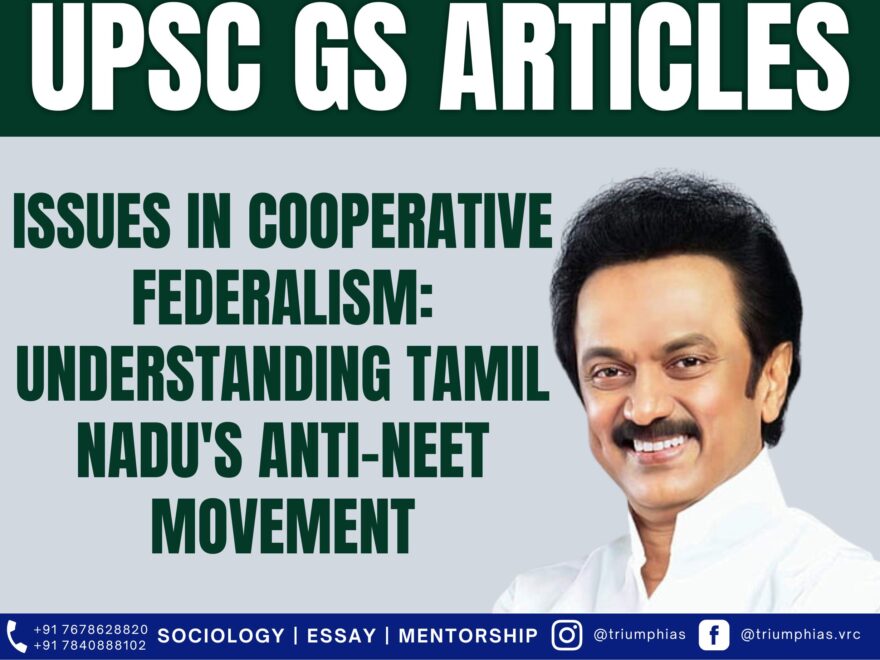Issue in Cooperative Federalism: Anti NEET Movement in Tamil Nadu
(Relevant for General Studies Paper Prelims/Mains)
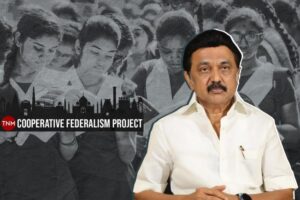
Recently, the Tamil Nadu government has introduced the Tamil Nadu Admission to Undergraduate Medical Degree Courses Bill, 2021, with the aim of exempting the state from the National Eligibility and Entrance Test (NEET). However, the Tamil Nadu Governor has declined to provide his approval for this bill. As a result, a standoff has arisen between the state government and the central authority, giving rise to significant apprehensions regarding the prospective trajectory of medical education and healthcare provisions within Tamil Nadu.
The state of Tamil Nadu has consistently expressed opposition to the imposition of NEET ever since its mandatory implementation in 2017. The NEET exam is perceived as a challenge to the state’s autonomy, healthcare infrastructure, principles of social equity, and educational standards. Given this context, it becomes imperative to delve into a comprehensive exploration of the merits and demerits associated with the National Eligibility and Entrance Test (NEET).
Advantages of Neet
- Unified Entrance Examination: The NEET examination serves as a singular entrance test for securing admission to medical and dental courses across India. It replaces the multitude of state-level and private examinations that were formerly conducted. This consolidation streamlines the process, saving students and colleges both time and resources. Students are relieved from the burden of applying to multiple exams and paying multiple fees, while colleges are spared the necessity of organizing separate tests and counseling sessions.
- Equity and Transparency: NEET substantially curbs the likelihood of corruption, fraudulent activities, and the leakage of question papers that were prevalent in some region-specific and independent exams. Additionally, it obviates the need for under-the-table donations or capitation fees to secure positions in private institutions. Admissions are grounded in the merit and ranking achieved by students in the NEET examination.
- Uniform Opportunity: The NEET exam offers an even-handed opportunity for students across the entire nation. It does not impinge upon the reservation policies of individual states or the central government. Each state has the prerogative to apply its distinct reservation system based on the merit list compiled by the National Testing Agency (NTA). Students can also opt for admission through either the state quota or the all India quota, depending on their eligibility and preference. This framework ensures that students hailing from rural or remote regions can compete on equal footing with their urban or metropolitan counterparts.
- Language Variety: The NEET examination is conducted in a diverse range of 13 languages, encompassing English, Hindi, Assamese, Bengali, Gujarati, Kannada, Malayalam, Marathi, Odia, Punjabi, Tamil, Telugu, and Urdu. This array of language options empowers students to select the language in which they feel most comfortable. This accommodation not only overcomes language barriers but also facilitates improved performance.
Issues Associated with NEET Exam
- Elevated Risk Element: The NEET examination stands as a notably intense competition, attracting a multitude of students each year. These students are granted a solitary opportunity annually to clear the exam and secure admission into their preferred college. Failing to do so necessitates a year-long wait or considering alternative courses. This circumstance can induce stress, anxiety, and depression, particularly among students who harbor substantial self-expectations as well as their parents’ aspirations.
- CBSE Curriculum: The NEET examination aligns itself with the CBSE syllabus, which may not be universally suitable. Students who have pursued education under diverse state boards might find it challenging to adapt to the syllabus and grapple with the exam’s difficulty level.
- Financial Consideration: The financial aspect of the NEET exam is not amicable to all students. General category candidates are required to pay an exam fee of Rs 1500, while reserved category candidates pay Rs 800. Beyond this, students also shoulder additional expenses such as coaching fees, study materials, travel costs, and more. For certain individuals hailing from impoverished or rural backgrounds, these financial burdens could be insurmountable. They might be compelled to compromise on the quality of their education or forsake their aspirations due to financial constraints.
- Language Hindrance: Given that NEET is only conducted in 13 languages, some students may encounter difficulty understanding the questions or articulating their responses in a language that is unfamiliar or differs from their mother tongue or instructional medium. This language barrier could potentially impede their comprehension and precision.
- Socioeconomic Factors: Various students may face obstacles stemming from their socioeconomic circumstances, including limited access to quality education, coaching, resources, or guidance. Such factors can hinder their preparation and performance in the NEET examination.
Why Tamil Nadu opposing the bill
- Challenging Federal Structure: NEET has not only disrupted the state’s provision of in-service quotas for medical graduates in the public sector but also sparked criticism for compromising the quality of healthcare.
- Limited Opportunities for Vulnerable Students: As outlined by the A.K. Rajan committee, which was commissioned by the Tamil Nadu Government in 2021 to assess NEET’s impact on medical admissions in the state, the examination disproportionately affects the aspirations and welfare of underprivileged students aspiring to pursue a medical career.
- Nurturing a Coaching-Centric Approach: The committee’s report condemns NEET for promoting a culture centered around coaching rather than fostering genuine learning. Moreover, it highlights the examination’s contribution to reinforcing biases related to culture, region, language, and socioeconomic factors, which further exacerbate disparities among marginalized groups.
- Tragic Consequences: NEET’s association with multiple cases of student suicides in Tamil Nadu has ignited public outrage and protests throughout the region. Students who have excelled in their board examinations or harbor a fervor for medicine have experienced a loss of hope and self-assurance following their inability to clear the NEET examination.
What should be done?
- Transferring Education Jurisdiction to State Level: It is conceivable to transfer the jurisdiction over education from the Concurrent List to the State List of the Constitution. This shift would grant greater autonomy and adaptability to individual states in determining their admission policies and prerequisites.
- Such a change would empower states to tailor their educational frameworks in accordance with local requirements and ambitions, effectively sidestepping conflicts with the central government concerning standardized entrance assessments like NEET.
- Harmonizing Equity and Excellence: A potential resolution might involve formulating a more comprehensive and well-rounded admission procedure that factors in NEET scores, Class XII marks, as well as other elements like aptitude, socio-economic status, regional diversity, and rural contributions. This approach would uphold both meritocratic principles and the principles of social justice, ensuring that individuals from diverse backgrounds have an equitable chance to pursue their aspirations of entering the medical profession.
- Preserving Representation for Underprivileged Groups, a commitment enshrined within the constitution, must be safeguarded without exception.
To master these intricacies and fare well in the Sociology Optional Syllabus, aspiring sociologists might benefit from guidance by the Best Sociology Optional Teacher and participation in the Best Sociology Optional Coaching. These avenues provide comprehensive assistance, ensuring a solid understanding of sociology’s diverse methodologies and techniques.
NEET, Tamil Nadu, cooperative federalism, medical education, healthcare, National Eligibility and Entrance Test, state autonomy, A.K. Rajan committee, medical admissions, coaching-centric approach, socioeconomic factors, language barriers, education jurisdiction, equity and excellence, underprivileged groups, student suicides, state list, concurrent list, Best Sociology Optional Coaching, Sociology Optional Syllabus.

Sociology Optional Syllabus
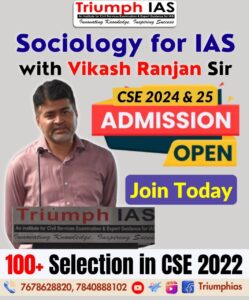
Course Commencement Information
- Enrolment is limited to a maximum of 250 Seats.
- Batch Timing: Evening Batch
- Course Duration: 4.5 Months
- Admission Open Online/Offline Batch
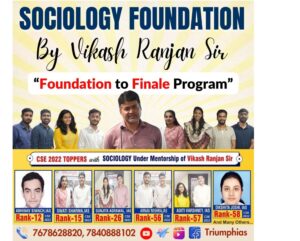
Instructional Format:
- Each class session is scheduled for a duration of two hours.
- At the conclusion of each lecture, an assignment will be distributed by Vikash Ranjan Sir for Paper-I & Paper-II coverage.
Study Material:
- A set of printed booklets will be provided for each topic. These materials are succinct, thoroughly updated, and tailored for examination preparation.
- A compilation of previous years’ question papers (spanning the last 27 years) will be supplied for answer writing practice.
- Access to PDF versions of toppers’ answer booklets will be available on our website.
- Post-course, you will receive two practice workbooks containing a total of 10 sets of mock test papers based on the UPSC format for self-assessment.
Additional Provisions:
- In the event of missed classes, video lectures will be temporarily available on the online portal for reference.
- Daily one-on-one doubt resolution sessions with Vikash Ranjan Sir will be organized post-class.
Syllabus of Sociology Optional
Paper-1
FUNDAMENTALS OF SOCIOLOGY
- Sociology – The Discipline
- Sociology as Science:
- Research Methods and Analysis:
- Sociological Thinkers:
- Karl Marx- Historical materialism, mode of production, alienation, class struggle.
- Emile Durkheim- Division of labour, social fact, suicide, religion and society.
- Max Weber- Social action, ideal types, authority, bureaucracy, protestant ethic and the spirit of capitalism.
- Talcott Parsons- Social system, pattern variables.
- Robert K. Merton- Latent and manifest functions, conformity and deviance, reference groups.
- Mead – Self and identity.
- Stratification and Mobility:
- Concepts- equality, inequality, hierarchy, exclusion, poverty and deprivation.
- Theories of social stratification- Structural functionalist theory, Marxist theory, Weberian theory.
- Dimensions – Social stratification of class, status groups, gender, ethnicity and race.
- Social mobility- open and closed systems, types of mobility, sources and causes of mobility.
- Works and Economic Life:
- Social organization of work in different types of society- slave society, feudal society, industrial /capitalist society
- Formal and informal organization of work.
- Labour and society.
- Politics and Society:
- Sociological theories of power.
- Power elite, bureaucracy, pressure groups, and political parties.
- Nation, state, citizenship, democracy, civil society, ideology.
- Protest, agitation, social movements, collective action, revolution.
- Religion and Society:
- Sociological theories of religion.
- Types of religious practices: animism, monism, pluralism, sects, cults.
- Religion in modern society: religion and science, secularization, religious revivalism, fundamentalism.
- Systems of Kinship:
- Family, household, marriage.
- Types and forms of family.
- Lineage and descent.
- Patriarchy and sexual division of labour.
- Contemporary trends.
- Social Change in Modern Society:
- Sociological theories of social change.
- Development and dependency.
- Agents of social change.
- Education and social change.
- Science, technology and social change.
Paper-2
INDIAN SOCIETY: STRUCTURE AND CHANGE
INTRODUCING INDIAN SOCIETY
- Perspectives on the study of Indian society:
- Indology (GS. Ghurye).
- Structural functionalism (M N Srinivas).
- Marxist sociology (A R Desai).
- Impact of colonial rule on Indian society :
- Social background of Indian nationalism.
- Modernization of Indian tradition.
- Protests and movements during the colonial period.
- Social reforms.
SOCIAL STRUCTURE
- Perspectives on the study of Indian society:
- The idea of Indian village and village studies.
- Agrarian social structure – evolution of land tenure system, land reforms.
- Caste System:
- Perspectives on the study of caste systems: GS Ghurye, M N Srinivas, Louis Dumont, Andre Beteille.
- Features of caste system.
- Untouchability – forms and perspectives.
- Tribal communities in India
- Definitional problems.
- Geographical spread.
- Colonial policies and tribes.
- Issues of integration and autonomy.
- Social Classes in India:
-
- Agrarian class structure.
-
-
- Industrial class structure.
- Middle classes in India.
-
- Systems of Kinship in India:
- Lineage and descent in India.
- Types of kinship systems.
- Family and marriage in India.
- Household dimensions of the family.
- Patriarchy, entitlements and sexual division of labour
- Religion and Society:
- Religious communities in India.
- Problems of religious minorities.
- Patriarchy, entitlements and sexual division of labour
SOCIAL CHANGES IN INDIA
- Visions of Social Change in India:
- Idea of development planning and mixed economy
- Constitution, law and social change.
- Education and social change.
- Rural and Agrarian transformation in India:
- Programmes of rural development, Community Development Programme, cooperatives,poverty alleviation schemes
- Green revolution and social change.
- Changing modes of production in Indian agriculture.
- Problems of rural labour, bondage, migration.
3. Industrialization and Urbanisation in India:
-
- Evolution of modern industry in India.
- Growth of urban settlements in India.
- Working class: structure, growth, class mobilization.
- Informal sector, child labour
- Slums and deprivation in urban areas.
4. Politics and Society:
-
- Nation, democracy and citizenship.
- Political parties, pressure groups , social and political elite
- Regionalism and decentralization of power.
- Secularization
5. Social Movements in Modern India:
-
- Peasants and farmers movements.
- Women’s movement.
- Backward classes & Dalit movement.
- Environmental movements.
- Ethnicity and Identity movements.
6. Population Dynamics:
-
- Population size, growth, composition and distribution
- Components of population growth: birth, death, migration.
- Population policy and family planning.
- Emerging issues: ageing, sex ratios, child and infant mortality, reproductive health.
7. Challenges of Social Transformation:
-
- Crisis of development: displacement, environmental problems and sustainability
- Poverty, deprivation and inequalities.
- Violence against women.
- Caste conflicts.
- Ethnic conflicts, communalism, religious revivalism.
- Illiteracy and disparities in education.
About Vikash Ranjan Sir
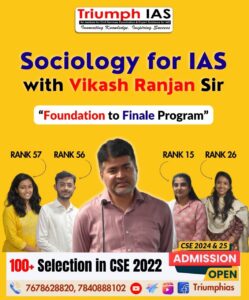
Vikash Ranjan Sir
(Best Sociology Optional Teacher, Educator, Mentor & Author)
Mr. Vikash Ranjan, arguably the Best Sociology Optional Teacher, has emerged as a versatile genius in teaching and writing books on Sociology & General Studies. His approach to the Sociology Optional Syllabus / Sociology Syllabus is remarkable, and his Sociological Themes and Perspectives are excellent. His teaching aptitude is Simple, Easy and Exam Focused. He is often chosen as the Best Sociology Teacher for Sociology Optional UPSC aspirants.
About Triumph IAS
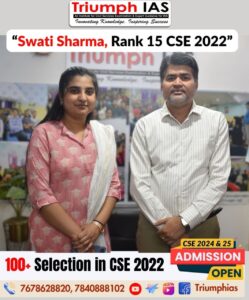
Innovating Knowledge, Inspiring Success We, at Triumph IAS, pride ourselves on being the best sociology optional coaching platform. We believe that each Individual Aspirant is unique and requires Individual Guidance and Care, hence the need for the Best Sociology Teacher. We prepare students keeping in mind his or her strength and weakness, paying particular attention to the Sociology Optional Syllabus / Sociology Syllabus, which forms a significant part of our Sociology Foundation Course.
Course Features
Every day, the Best Sociology Optional Teacher spends 2 hours with the students, covering each aspect of the Sociology Optional Syllabus / Sociology Syllabus and the Sociology Course. Students are given assignments related to the Topic based on Previous Year Question to ensure they’re ready for the Sociology Optional UPSC examination.
Regular one-on-one interaction & individual counseling for stress management and refinement of strategy for Exam by Vikash Ranjan Sir, the Best Sociology Teacher, is part of the package. We specialize in sociology optional coaching and are hence fully equipped to guide you to your dream space in the civil service final list.
Specialist Guidance of Vikash Ranjan Sir
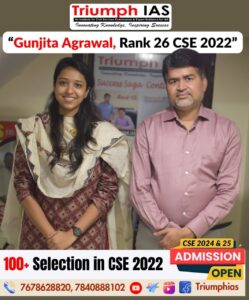
Vikash Ranjan Sir is a specialist and arguably the Best Sociology Optional Teacher. His scientific, systematic, applied & exam-focused approach has helped many students to get selected in the Civil Services.
The Best Sociology Teacher helps students to get a complete conceptual understanding of each and every topic of the Sociology Optional Syllabus / Sociology Syllabus, enabling them to attempt any of the questions, be direct or applied, ensuring 300+ Marks in Sociology Optional.
Classrooms Interaction & Participatory Discussion
The Best Sociology Teacher, Vikash Sir, ensures that there’s explanation & DISCUSSION on every topic of the Sociology Optional Syllabus / Sociology Syllabus in the class. The emphasis is not just on teaching but also on understanding, which is why we are known as the Best Sociology Optional Coaching institution.
Preparatory-Study Support
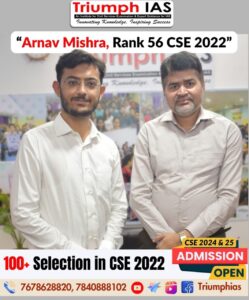
The Sociology Foundation Course is designed to provide students with a strong base for the Sociology Optional. Study support from Triumph IAS & personal mentorship of the Best Sociology Teacher, Vikash Sir, is provided till final selection. Vikash Sir provides special guidance session for “Essay & Mains General Study” too, making our Sociology Course a well-rounded one.
Online Support System (Oss)
Get access to an online forum for value addition study material, journals, and articles relevant to Sociology on www.triumphias.com. Ask preparation related queries directly to the Best Sociology Teacher, Vikash Sir, via mail or WhatsApp.
Strategic Classroom Preparation
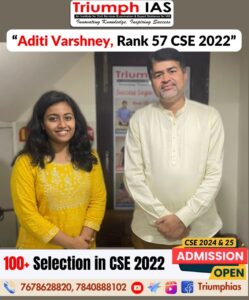
Our Sociology Course is characterized by interactive and applied teaching with an “Exam Focussed” approach, which inculcates a Sociological sense and competency in the students. The Sociology Foundation Course, lasting four months, includes theoretical discussion, concept building, and answer writing with a focus on learning & application.
Comprehensive Study Material
We provide printed booklets of concise, well-researched, exam-ready study material for every unit of the Sociology Optional Syllabus / Sociology Syllabus, making us the Best Sociology Optional Coaching platform.
Why Vikash Ranjan’s Classes for Sociology?
Proper guidance and assistance are required to learn the skill of interlinking current happenings with the conventional topics. VIKASH RANJAN SIR at TRIUMPH IAS guides students according to the Recent Trends of UPSC, making him the Best Sociology Teacher for Sociology Optional UPSC.
At Triumph IAS, the Best Sociology Optional Coaching platform, we not only provide the best study material and applied classes for Sociology for IAS but also conduct regular assignments and class tests to assess candidates’ writing skills and understanding of the subject.
Choose The Best Sociology Optional Teacher for IAS Preparation?
At the beginning of the journey for Civil Services Examination preparation, many students face a pivotal decision – selecting their optional subject. Questions such as “which optional subject is the best?” and “which optional subject is the most scoring?” frequently come to mind. Choosing the right optional subject, like choosing the best sociology optional teacher, is a subjective yet vital step that requires a thoughtful decision based on facts. A misstep in this crucial decision can indeed prove disastrous.
Ever since the exam pattern was revamped in 2013, the UPSC has eliminated the need for a second optional subject. Now, candidates have to choose only one optional subject for the UPSC Mains, which has two papers of 250 marks each. One of the compelling choices for many has been the sociology optional. However, it’s strongly advised to decide on your optional subject for mains well ahead of time to get sufficient time to complete the syllabus. After all, most students score similarly in General Studies Papers; it’s the score in the optional subject & essay that contributes significantly to the final selection.
“A sound strategy does not rely solely on the popular
Opinion of toppers or famous YouTubers cum teachers.”
It requires understanding one’s ability, interest, and the relevance of the subject, not just for the exam but also for life in general. Hence, when selecting the best sociology teacher, one must consider the usefulness of sociology optional coaching in General Studies, Essay, and Personality Test.
The choice of the optional subject should be based on objective criteria, such as the nature, scope, and size of the syllabus, uniformity and stability in the question pattern, relevance of the syllabic content in daily life in society, and the availability of study material and guidance. For example, choosing the best sociology optional coaching can ensure access to top-quality study materials and experienced teachers. Always remember, the approach of the UPSC optional subject differs from your academic studies of subjects. Therefore, before settling for sociology optional, you need to analyze the syllabus, previous years’ pattern, subject requirements (be it ideal, visionary, numerical, conceptual theoretical), and your comfort level with the subject.
This decision marks a critical point in your UPSC – CSE journey, potentially determining your success in a career in IAS/Civil Services. Therefore, it’s crucial to choose wisely, whether it’s the optional subject or the best sociology optional teacher. Always base your decision on accurate facts, and never let your emotional biases guide your choices. After all, the search for the best sociology optional coaching is about finding the perfect fit for your unique academic needs and aspirations.
To master these intricacies and fare well in the Sociology Optional Syllabus, aspiring sociologists might benefit from guidance by the Best Sociology Optional Teacher and participation in the Best Sociology Optional Coaching. These avenues provide comprehensive assistance, ensuring a solid understanding of sociology’s diverse methodologies and techniques. Sociology, Social theory, Best Sociology Optional Teacher, Best Sociology Optional Coaching, Sociology Optional Syllabus.
Best Sociology Optional Teacher, Sociology Syllabus, Sociology Optional, Sociology Optional Coaching, Best Sociology Optional Coaching, Best Sociology Teacher, Sociology Course, Sociology Teacher, Sociology Foundation, Sociology Foundation Course, Sociology Optional UPSC, Sociology for IAS,
Follow us :
🔎 https://www.instagram.com/triumphias
🔎https://www.youtube.com/c/TriumphIAS
https://t.me/VikashRanjanSociology
Find More Blogs
|
Scope of the subject and comparison with other social sciences |
|||
|
|
|
|
Modernity and social changes in Europe |

